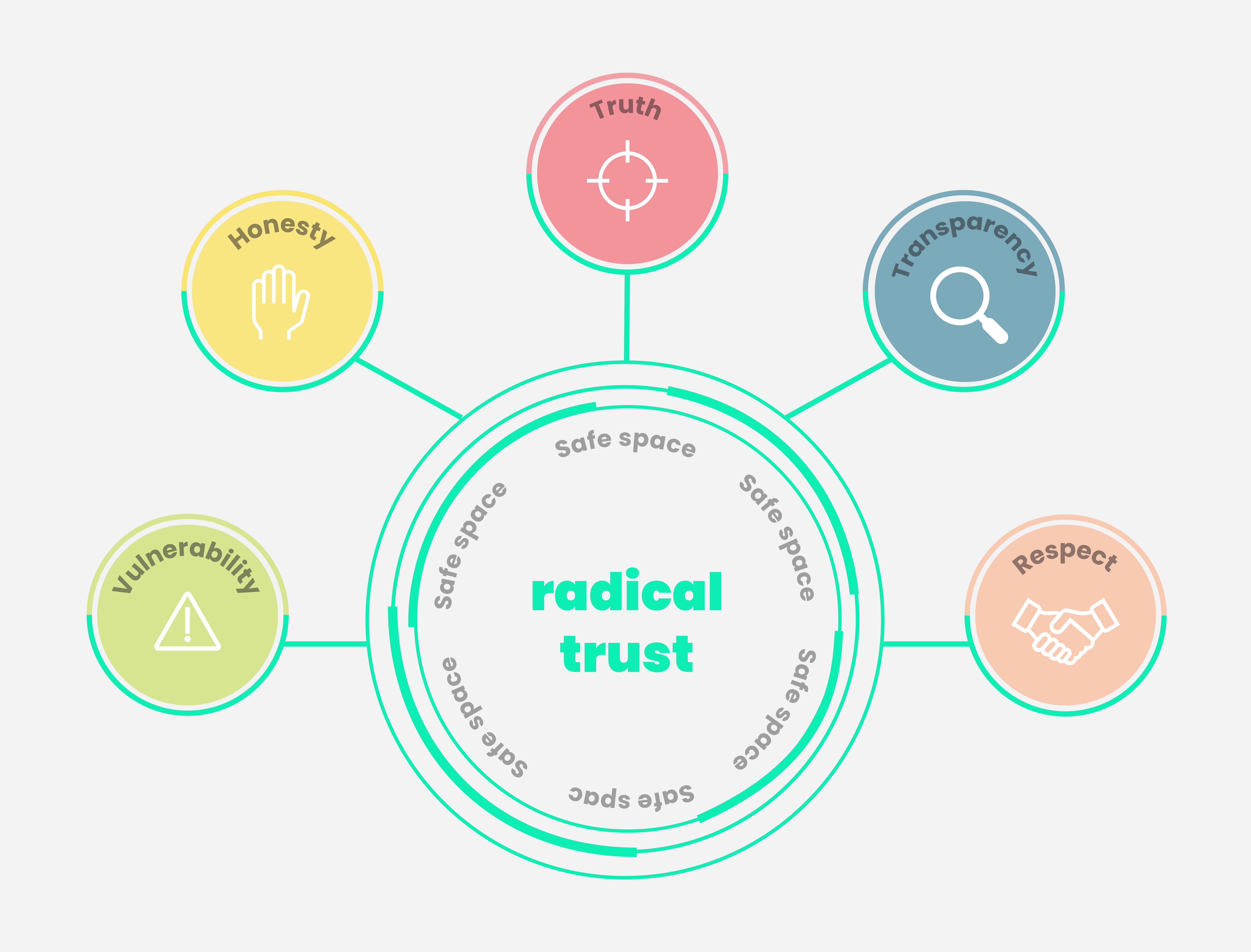Insights
Radical Trust: The True Power of Brave Organizations
4 min
Can an organization truly thrive without confronting its most uncomfortable truths?
Trust is the foundation upon which organizations aspiring for more than mere survival are built. However, in today’s business environment, where superficiality and half-truths prevail, radical trust has become a rarity. Companies talk about transparency and openness, but the fear of discomfort or exposing vulnerabilities remains a nearly insurmountable obstacle.
Building true radical trust doesn’t mean sharing all information unfiltered; it’s about creating safe spaces where trust is genuine and constructive. It’s about fostering a culture where people feel protected and valued and where they can speak and hear the truth safely. In these environments, trust not only thrives but also drives real and sustainable growth within the organization.

Are we prepared to receive the transparency we ask for?
It’s easy to demand transparency from the bottom up, but are we truly ready to accept it, especially when the news isn’t favorable? Radical trust requires a collective commitment and an environment where every member understands that openness involves confronting uncomfortable truths while accepting that not all information can be shared indiscriminately.
Leadership based on radical trust balances two fundamental pillars: being straightforward and, at the same time, showing genuine care for people. This means that leaders must be vulnerable, accessible, and willing to share challenges while establishing clear boundaries about what can and cannot be shared. Being direct is not being insensitive; in fact, it’s a form of respect toward others and the shared purpose. In this balance, a cohesive and resilient team is built, where transparency is safe and effective.

Are we ready to build a culture where sincere honesty and mutual respect are the norm?
To develop a well-managed culture of radical trust, teams must understand that frankness doesn’t mean indiscriminately revealing information, but rather creating an environment where people can speak sincerely and respectfully. Here are some principles to foster it:
It’s not enough to open communication channels; organizations need environments where employees can express concerns and opinions without fear of retaliation. This requires leaders who listen with intent and without impulsive reactions.
Leaders must model the behavior they expect from their teams. Admitting mistakes, sharing challenges, and being transparent about difficult decisions strengthen trust and define clear boundaries for transparency within the organization. This sets the limits of transparency and indicates when it should be reinforced.
Trust isn’t built merely by listening; it solidifies when words are turned into actions. This means decisions should be influenced by everyone’s contributions, recognizing the value of each input. Showing that employees’ opinions matter is key to creating a sense of belonging and security.
Trust involves not only speaking frankly but also receiving such frankness with maturity. Decisions, even when incomplete in their information, should be communicated in a way that the team understands they are made for the common good. This also means teams must be prepared to accept difficult feedback without losing their commitment.
Being direct is essential, but without empathy, it can be destructive. Radical honesty requires that every direct conversation be based on respect and care. Organizations must teach their members to communicate clearly and compassionately so that honesty becomes a bridge, not a barrier. Telling the truth is an act of respect, and when done well, it strengthens trust and respect throughout the organization.

What if true strength lies in embracing our own vulnerabilities?
Can an organization truly be strong without accepting its own vulnerabilities? To build genuine trust, leaders must create spaces of psychological safety where employees feel they can make mistakes without fear of reprisal. An organization’s true strength doesn’t lie in avoiding mistakes but in having the courage to face them head-on.
At the heart of radical trust is shared vulnerability. The organization must establish boundaries of trust that allow teams to experiment safely, knowing they can fail and learn without compromising their value or sense of belonging. Teams that feel safe to try, fail, and learn within these boundaries develop resilience and cohesion that no external crisis can break.
Do we have the courage to face uncomfortable truths and act on them?
The real question isn’t whether trust should be built but whether we are willing to pay the price: do we have the courage to face uncomfortable truths and act on them? Because, in the end, radical trust—well-managed within its limits—makes the difference between navigating turbulent waters or sinking in the attempt.
When people feel their well-being is protected and that they can be honest without fear, they commit more deeply to the organization’s purpose. In a world where uncertainty is the only constant, authentic trust, built and reinforced through protective boundaries and openness, is what truly matters. Only brave organizations—those that understand where and how to apply trust—are willing to take that journey.
Subscribe to receive the latest news from our blog
